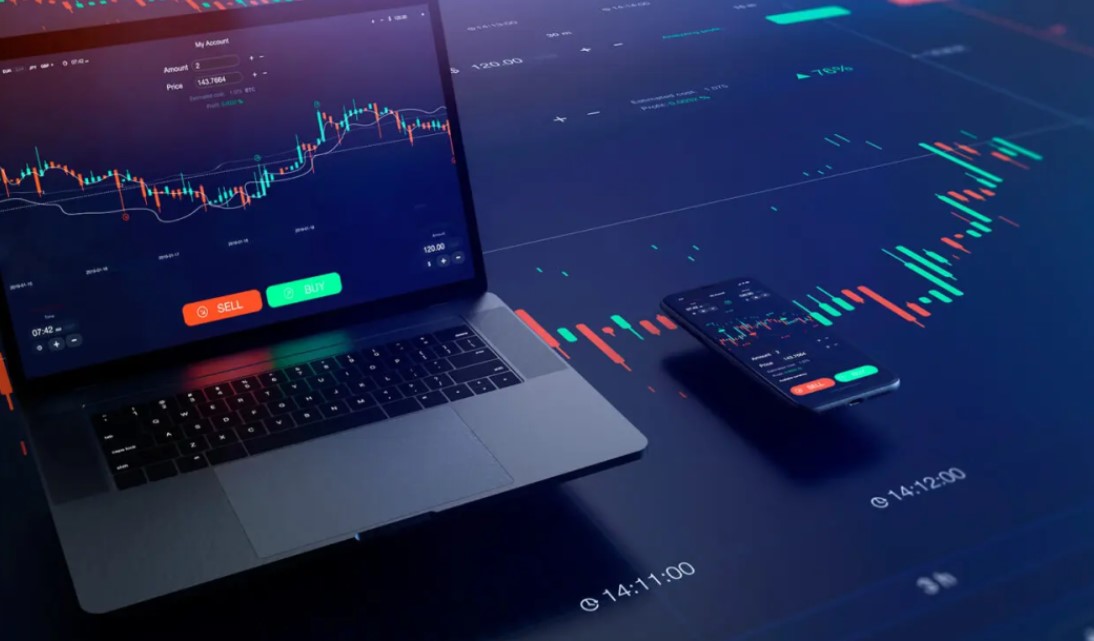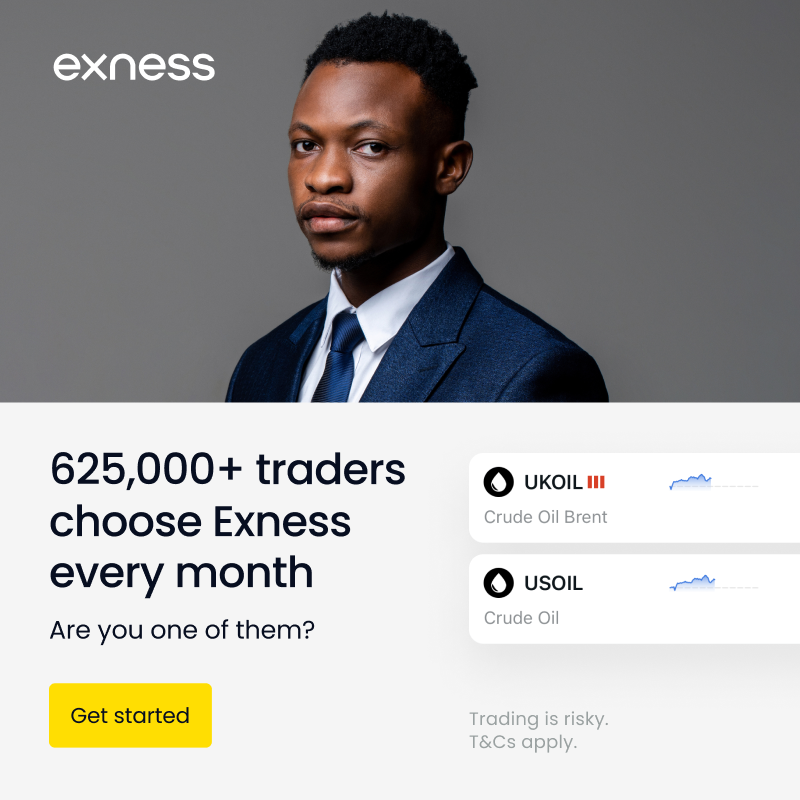
9 minute read
How to Start Forex Trading in Qatar: A Comprehensive Guide
from Exness
by Exness_Blog
Forex trading, or foreign exchange trading, is one of the most dynamic and accessible financial markets in the world. With a daily trading volume exceeding $7 trillion, it offers immense opportunities for individuals looking to diversify their income streams. For residents of Qatar, a country known for its robust economy and growing financial sector, forex trading is an attractive way to engage with global markets. However, starting forex trading in Qatar requires careful planning, education, and adherence to local regulations. In this guide, we’ll walk you through the essential steps to start forex trading in Qatar, ensuring you’re equipped with the knowledge to make informed decisions.
Top 4 Best Forex Brokers in Qatar
1️⃣ Exness: Open An Account or Visit Brokers 🏆
2️⃣ XM: Open An Account or Visit Brokers 💥
3️⃣ JustMarkets: Open An Account or Visit Brokers ✅
4️⃣ Quotex: Open An Account or Visit Brokers 🌐
What is Forex Trading?
Forex trading involves buying and selling currencies to profit from fluctuations in their exchange rates. For example, you might buy the US dollar against the Qatari Riyal (USD/QAR) if you believe the dollar will strengthen. The forex market operates 24/5, making it highly flexible for traders in Qatar, whether you’re a full-time professional or trading part-time.
In Qatar, forex trading is gaining popularity due to the country’s stable economy, high internet penetration, and access to global financial platforms. However, success in forex trading requires understanding the market, managing risks, and choosing the right tools and brokers.
Why Start Forex Trading in Qatar?
Qatar’s economic landscape makes it an ideal place to explore forex trading. Here are some reasons why:
Strong Economy: Qatar’s wealth, driven by its oil and gas sector, supports a stable currency (Qatari Riyal, QAR), which is pegged to the US dollar. This stability can be advantageous for forex traders.
High Internet Penetration: With widespread access to high-speed internet, Qataris can easily access trading platforms and educational resources.
Global Financial Access: Qatar’s open economy allows residents to engage with international brokers and markets.
Growing Financial Literacy: The rise of financial education in Qatar has empowered individuals to explore investment opportunities like forex trading.
However, forex trading carries risks, including the potential for significant financial losses. Understanding these risks and preparing thoroughly is crucial before diving in.
Step-by-Step Guide to Start Forex Trading in Qatar
1. Educate Yourself About Forex Trading
Before risking your capital, invest time in learning the basics of forex trading. Understanding key concepts will help you navigate the market confidently. Here’s what to focus on:
Currency Pairs: Learn about major, minor, and exotic currency pairs. For example, USD/QAR is relevant for Qatari traders, but major pairs like EUR/USD or GBP/USD are more liquid.
Market Analysis: Study technical analysis (charts, indicators) and fundamental analysis (economic news, interest rates) to predict price movements.
Risk Management: Understand concepts like leverage, margin, and stop-loss orders to protect your capital.
Trading Platforms: Familiarize yourself with platforms like MetaTrader 4 (MT4) or MetaTrader 5 (MT5), which are widely used by traders.
Resources for Learning:
Online courses on platforms like Coursera, Udemy, or Babypips (a free forex education site).
YouTube channels and webinars by reputable traders.
Books like Currency Trading for Dummies or The Little Book of Currency Trading.
In Qatar, you can also explore local workshops or financial seminars hosted by banks or investment firms to gain insights tailored to the region.
2. Understand Qatar’s Forex Trading Regulations
Forex trading in Qatar is legal, but it’s essential to operate within the country’s regulatory framework. The Qatar Central Bank (QCB) oversees financial activities, and while forex trading is not heavily regulated for retail traders, you should ensure compliance with local laws.
Key Considerations:
Broker Regulation: Choose a broker regulated by reputable authorities like the UK’s Financial Conduct Authority (FCA), Cyprus Securities and Exchange Commission (CySEC), or the Australian Securities and Investments Commission (ASIC). Qatar does not have a dedicated forex regulatory body, so international oversight is critical.
Tax Implications: Qatar does not impose personal income tax, which is advantageous for traders. However, consult a financial advisor to understand any reporting requirements for profits earned abroad.
Sharia-Compliant Trading: For Muslim traders in Qatar, opt for brokers offering Islamic (swap-free) accounts that comply with Sharia principles, avoiding interest-based transactions.
Always verify a broker’s legitimacy by checking their licensing and reading reviews from other traders.
3. Choose a Reliable Forex Broker
Selecting the right broker is one of the most critical decisions for forex trading in Qatar. A good broker offers a user-friendly platform, competitive spreads, and robust customer support. Here’s what to look for:
Regulation: Ensure the broker is regulated by a trusted authority to protect your funds.
Trading Platform: Choose a broker offering MT4, MT5, or proprietary platforms with advanced charting tools.
Account Types: Look for brokers with account types suited to beginners, such as micro or cent accounts with low minimum deposits.
Customer Support: Opt for brokers with 24/7 support, ideally with Arabic-speaking representatives for convenience in Qatar.
Deposit and Withdrawal Options: Ensure the broker supports payment methods available in Qatar, such as bank transfers, credit cards, or e-wallets like PayPal or Skrill.
Popular Brokers for Qatari Traders: While I cannot recommend specific brokers without real-time data, some globally recognized names include Exness, XM, and Pepperstone, which often cater to Middle Eastern traders. Always research the broker’s reputation and ensure they offer Islamic accounts if needed.
Pro Tip: Start with a demo account to test the broker’s platform and practice trading without risking real money.

💥 Trade with Exness now: Open An Account or Visit Brokers 🏆
4. Open a Forex Trading Account
Once you’ve chosen a broker, follow these steps to open an account:
Visit the Broker’s Website: Select “Open Account” or “Register.”
Complete the Application: Provide personal details, including your name, address, and identification documents (e.g., Qatar ID or passport).
Verify Your Identity: Upload documents like a passport, utility bill, or bank statement for KYC (Know Your Customer) compliance.
Choose an Account Type: Select an account that matches your experience level and budget (e.g., standard, micro, or Islamic).
Deposit Funds: Fund your account using a payment method available in Qatar. Most brokers accept bank transfers or credit cards, with minimum deposits ranging from $100 to $500.
After funding your account, download the trading platform (e.g., MT4) and log in with your credentials.
5. Develop a Trading Plan
A trading plan is your roadmap to success in forex trading. Without a clear strategy, you’re more likely to make emotional decisions that lead to losses. Your plan should include:
Trading Goals: Define whether you’re trading for supplemental income, long-term wealth, or skill development.
Risk Management: Decide how much of your capital you’re willing to risk per trade (e.g., 1-2% of your account balance).
Trading Style: Choose a style that suits your schedule, such as day trading, swing trading, or scalping.
Entry and Exit Rules: Set criteria for entering and exiting trades based on technical or fundamental analysis.
Record Keeping: Maintain a trading journal to track your trades, analyze performance, and identify areas for improvement.
For Qatari traders, consider the time zone (AST, UTC+3) when planning trades. The forex market’s major sessions (London, New York, Tokyo) may overlap with evening hours in Qatar, offering optimal trading opportunities.
6. Practice with a Demo Account
Before trading with real money, practice on a demo account. Most brokers offer demo accounts with virtual funds, allowing you to:
Test your trading strategy in real market conditions.
Familiarize yourself with the trading platform’s features.
Build confidence without financial risk.
Spend at least 1-2 months practicing on a demo account until you consistently achieve positive results.
7. Start Trading with Real Money
Once you’re confident in your skills, transition to live trading. Start small to minimize risk:
Use Low Leverage: Leverage amplifies both profits and losses. In Qatar, brokers may offer high leverage (e.g., 1:100 or 1:500), but beginners should use low leverage (e.g., 1:10) to manage risk.
Set Stop-Loss Orders: Always use stop-loss orders to limit potential losses on each trade.
Monitor Economic News: Stay updated on global economic events, such as US Federal Reserve decisions or OPEC announcements, which can impact currency pairs.
8. Stay Informed and Keep Learning
Forex trading is a continuous learning journey. Stay updated on market trends and refine your skills by:
Following financial news on platforms like Bloomberg, Reuters, or Al Jazeera.
Joining forex trading communities in Qatar or online forums like Forex Factory.
Attending webinars or workshops offered by brokers or financial institutions.
In Qatar, consider networking with local traders or joining investment clubs to exchange insights and strategies.
Tips for Successful Forex Trading in Qatar
Start Small: Begin with a modest investment to gain experience without risking significant capital.
Avoid Emotional Trading: Stick to your trading plan and avoid impulsive decisions driven by fear or greed.
Use Reliable Technology: Ensure you have a stable internet connection and a secure device for trading.
Diversify Your Portfolio: Don’t focus solely on one currency pair; explore multiple pairs to spread risk.
Seek Professional Advice: Consult a financial advisor to align your trading activities with your overall financial goals.
Common Mistakes to Avoid
Overleveraging: High leverage can lead to substantial losses, especially for beginners.
Ignoring Risk Management: Failing to set stop-loss orders or risking too much per trade can wipe out your account.
Chasing Losses: Avoid increasing your trade size to recover losses; this often leads to bigger setbacks.
Lack of Education: Trading without sufficient knowledge is a recipe for failure.
Is Forex Trading Right for You?
Forex trading offers exciting opportunities but isn’t suitable for everyone. It requires time, discipline, and a willingness to learn. If you’re in Qatar and considering forex trading, assess your financial situation, risk tolerance, and commitment to learning before starting.
Key Questions to Ask Yourself:
Do I have enough time to learn and monitor the markets?
Am I comfortable with the risks involved?
Can I afford to lose my initial investment?
If you’re ready to take on the challenge, forex trading can be a rewarding venture with the right approach.
Conclusion
Starting forex trading in Qatar is an achievable goal with the right preparation. By educating yourself, choosing a regulated broker, developing a solid trading plan, and practicing diligently, you can navigate the forex market with confidence. Qatar’s stable economy and access to global financial tools make it an excellent place to begin your trading journey. However, always prioritize risk management and continuous learning to maximize your chances of success.
Ready to take the first step? Open a demo account today, explore the forex market, and start building your trading skills. With patience and discipline, you can unlock the potential of forex trading in Qatar.
💥 Note: To enjoy the benefits of the partner code, such as trading fee rebates, you need to register with Exness through this link: Open An Account or Visit Brokers 🏆
Read more:

